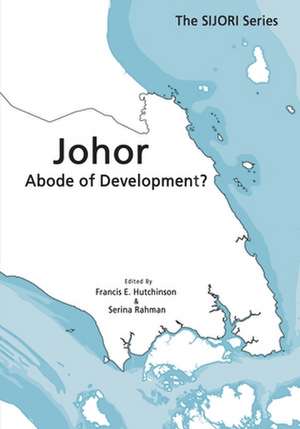Johor
Editat de Francis E Hutchinson, Serina Rahmanen Limba Engleză Paperback – sep 2020
While welcome, this structural transformation has also entailed important challenges and strategic choices. After three decades, Johor's manufacture-for-export model is under question, as it faces increasing competition and flat-lining technological capabilities. In response, the state has sought to diversify its economy through strategic investments in new, mostly service-based activities. Yet, Johor retains pockets of excellence in traditional sectors that also require support and policy attention.
The state's economic transformation has also been accompanied by far-reaching political, social, and environmental change. Not least, Johor's growing population has generated demand for affordable housing and put pressure on public services. The strain has been exacerbated by workers from other states and overseas. These demographic factors and large-scale projects have, in turn, put stress on the environment.
These economic and social changes have also had political ramifications. While Johor is a bastion of two of the country's oldest and most established political parties, the state's large, urban and connected electorate has made it hospitable terrain for new political organisations. Beyond electoral politics, Johor is also the home of a powerful and influential royal family, with very specific ideas about its role in the state's political life.
Building on earlier work by the ISEAS - Yusof Ishak Institute on the Singapore-Johor-Riau Islands Cross-border Region, this book focuses on this important Malaysian state, as it deals with important domestic challenges on one hand and strives to engage with international markets on the other.
"I have always felt that there are many more complementarities possible between Singapore and Johor. This would be to the benefit of both economies, but the political division between the two was just too great. The two economies lived adjacent but separate lives-Singapore looking out to the world and Johor looking north-until initiatives such as the Iskandar Malaysia development corridor began to change things significantly. The concern now is that the pendulum may have swung too much the other way, driven by the huge income and price differentials as well as Singapore's global city status. Francis and Serina's compilation is a welcomed attempt at understanding Johor in a much more comprehensive manner; not just its changing economy but how its politics and society have been impacted by these changes - which is a more endogenized view of economic integration." - Dr Nungsari Ahmad Radhi, former MP Balik Palau and Executive Director, Khazanah Nasional
Preț: 351.59 lei
Nou
Puncte Express: 527
Preț estimativ în valută:
67.28€ • 73.31$ • 56.69£
67.28€ • 73.31$ • 56.69£
Carte disponibilă
Livrare economică 02-16 aprilie
Preluare comenzi: 021 569.72.76
Specificații
ISBN-13: 9789814881272
ISBN-10: 9814881279
Pagini: 568
Dimensiuni: 178 x 254 x 30 mm
Greutate: 1.05 kg
Editura: Iseas-Yusof Ishak Institute
ISBN-10: 9814881279
Pagini: 568
Dimensiuni: 178 x 254 x 30 mm
Greutate: 1.05 kg
Editura: Iseas-Yusof Ishak Institute
Notă biografică
Francis E. Hutchinson (Editor) Francis E. Hutchinson is senior fellow and coordinator of the Regional Economic Studies Programme at the ISEAS-Yusof Ishak Institute, Singapore, and managing editor of the Journal of Southeast Asian Economies.Serina Rahman (Editor) Serina Rahman is Visiting Fellow in the Malaysia Studies Programme at the ISEAS - Yusof Ishak Institute, Singapore.
Descriere
Building upon earlier work by the ISEAS-Yusof Ishak Institute on the Singapore-Johor-Riau Islands Cross-Border Region, this book focuses on this important Malaysian state, as it deals with important domestic challenges on one hand and strives to engage with international markets on the other.
